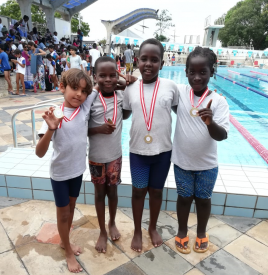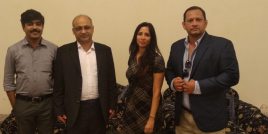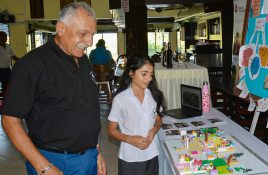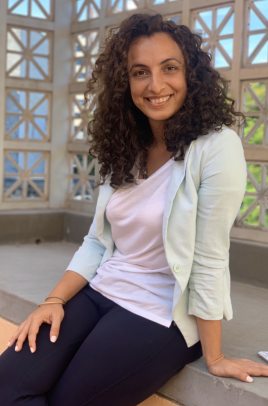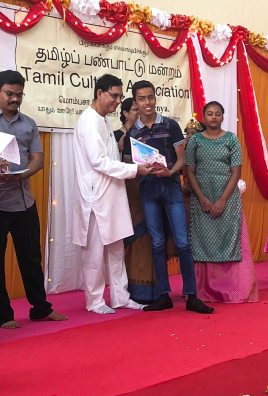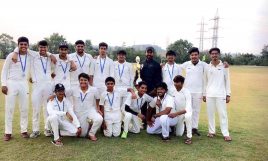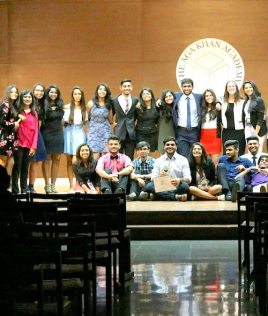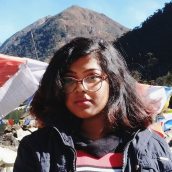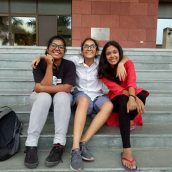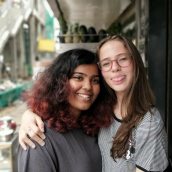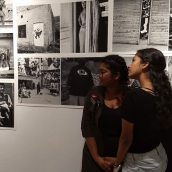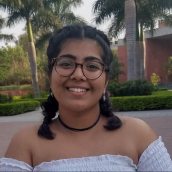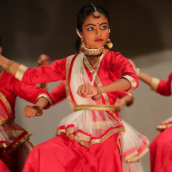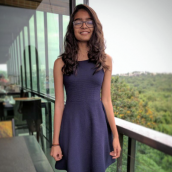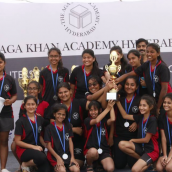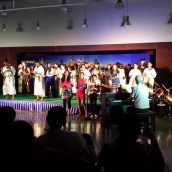Kelvin Bagthariya: Generating positive change with resilience
Kelvin Bagthariya, a second-year Diploma student at the Aga Khan Academy Hyderabad, believes that his time at the Academy has taught him one thing in particular: resilience. Kelvin joined the Academy in year 9, and having come from a small town in Gujarat, it was a completely different environment. He believes the Academy has changed his mindset, teaching him to become independent, improving his self-esteem and allowing him to pursue his passion to make a change in his community.
“It was hard for me in the ninth grade as I grew up in a conservative society where people had closed mentalities and viewed life with confined perspectives – it was totally opposite when I came [to the Academy]. I was surrounded by people from diverse communities, with different perceptions and different approaches towards learning. Coming here to the Academy made me adapt to the pluralistic environment, helped me overcome new challenges and integrate [His Highness’s] vision towards my learning.”
For Kelvin, the attitude and assistance of the staff, teachers and his peers at the Academy were the reasons behind his resilience through this tough transition, especially in adjusting to a new way of learning and thinking. They were extremely encouraging towards Kelvin, which empowered him to take responsibility, get involved in enrichment activities and take on leadership roles.
“The journey has [inspired] many transformations in me since I joined. If I recall my first day [at the Academy], everything was new to me. I felt I wouldn’t be comfortable or accepted, and the first few months were lonely. But what the Academy has taught me is that you have to be independent. The Academy offers various opportunities from sports, service projects and various events. …Throughout my journey, being part of the school cricket team, participating and leading various service projects, being head of logistics in Model United Nations, summer internships, school trips and participating in cultural events has shaped me as an individual. It is very different from other schools. The journey wasn’t easy and couldn’t have been possible without my peers, teachers and assistance staff. After four years, if I look at myself, it is a proud moment for me.”
During his four years at the Academy, Kelvin has particularly enjoyed being part of the cricket team, Model United Nations, initiating the organic farming project at the Academy and doing a summer internship with the Aga Khan Foundation. Kelvin explains, “Enrichment activities give you a taste of real life and how it works.”
Through these enrichment activities and involvement in the community at the Academy, Kelvin was encouraged to contribute to the community in his hometown. “I am very passionate about bringing change in the society. When I see a problem, I want to make a change. I have the passion to be a leader and take responsibility. I always want to take initiative.”
Kelvin has taken initiative on an issue close to his heart and one of most pressing public health issues in his hometown: tobacco addiction. Kelvin lost a close friend to tobacco addiction, so he decided to partner with institutions in the Ismaili community such as the Aga Khan Education Board and the Aga Khan Youth and Sports Board to run a campaign to inform people about the consequences of addiction through a short movie that he scripted and acted in. He also created a youth group, worked with families struggling with addiction, visited schools and vulnerable areas, and organized health checkups. The project even received an award from the local government for its effort to mitigate tobacco addiction.
“I felt proud when 15-20 people came to me and said they are no longer addicted,” Kelvin shares.
Kelvin owes his enthusiasm to take initiative to the Academy, where he had always been motivated to do the same through his CAS and enrichment activities.
After graduating from the Academy, Kelvin wishes to pursue a degree in computer science in Canada. He hopes to use his education to work for the good of society, in particular for the Aga Khan Development Network and in the direction of His Highness the Aga Khan’s vision of improving the quality of life of people.
“His Highness says when you leave the Academy, you should be working for change in your own community. I have the responsibility as a global citizen to make a change””
By Inaara Gangji
Eshwari Ramsali (Class of 2018) - fusing art and ideology
“Honestly, it still hasn’t hit me that I get to go to the college of my dreams,” she said. “It’s so surreal.”
Two years ago Eshwari wrote an entrance assessment test at the Aga Khan Academy Hyderabad but was not sure if she would be able to join.
“I was dismayed because I loved the concept of an IB education,” she said. “The Academy made it possible for me to be here.”
Eshwari joined the Academy in 2016 and used every opportunity to learn and to express herself, diving into visual arts and global politics courses. She attributes a lot of her personal and intellectual growth to the discussions she had in her Theory of Knowledge (ToK) class.
“It upsets me that I will never have another ToK class,” she mused.
After her creativity, activity, service (CAS) summer internship in Dehradun, Uttarakhand, Eshwari stayed on to do an internship at a film production house, working in production and postproduction on documentary films.
“I like to call it the summer I became a feminist,” she said. “Feminism, for me is a social movement whose success lies in providing equal opportunities for all sexes and genders.”
For Eshwari, it is natural for film and feminism to go together. She describes art and politics as her academic crushes and appreciates the IB for having the accoutrements that allow for interdisciplinary approach to learning. Her extended essay combined visual arts and global politics to write a compelling piece on freedom of expression and art activism. Eshwari’s display at the 2018 Diploma Programme Visual Arts Exhibition also espoused the mingling of subjects, presenting work with powerful feminist overtones.
“Eshwari has exemplary artistic calibre,” said Senior School art teacher, Vijayraghavan Srinivasan. “She has a meta-narrative quality in her pictorial composition which captures recollecting past memories and incidents, fusing them with self-discovery."
The DP Visual Arts Exhibition is a red letter day for Senior students and they work long hours to see it come to life.
“Personally explaining my art and concepts to viewers and seeing realisation dawn on their faces was incredibly rewarding,” Eshwari said. “The exhibition was so important for so many different reasons, and being a part of it with some of the most talented students of the Academy made me happy.”
Eshwari remembers not being confident about her decision to join the arts programme at the Academy, but she’s pleased that she did. Through the programme, Eshwari got to work with professional artists and sculptors, and also discovered artists and filmmakers whose work inspires her and helps her identify herself. Vijayraghavan describes her artwork as insightful and contemplative, and also explorative.
Though she is an exceptional artist, Eshwari wants to study political science so she can pursue a career as a humanitarian lawyer or work in development. She intends on taking courses in art history, so that she can seamlessly step back into the art world, should the opportunity arise.
“The idea of being intellectually stimulated even well into my 50s really excites me.”
Somewhere between learning about the IB and her last ToK class, Eshwari fell in love with the Academy.
“I love that my classes are filled with students from all parts of the country,” she said, “irrespective of their financial standing or cultural background. I strongly believe it helps build our vision of pluralism.”
We wish her and all the rest of the Class of 2018 the best of luck in all their future endeavors!
Anahita Aman: Grateful for the Academy’s holistic approach to learning and development
Anahita Aman is in her seventh year at the Aga Khan Academy in Hyderabad. Having started there in grade 5, she is now a grade 11 student in the Diploma Programme. She is wise beyond her years and yet has a youthfulness that is contagious. She is full of hopes and dreams and strives to get the most out of her days at the Academy so that she can ultimately give back to the community and society at large.
For Anahita, the strongest part of the Academy is its holistic approach to student development. “They don’t just focus on the academics but also on sports, music and art – so in that way it’s a really holistic approach to learning, and it’s helped me develop into a multidimensional and multifaceted person,” Anahita says. This holistic approach means that she gets the freedom to explore her passions, and that excites her. She loves music – whether it be singing, playing the keyboard and tabla, or learning Indian dance. She is also a self-proclaimed feminist who is passionate about gender-based violence, gender equality and education for girls. She recently had the chance to fuse these two passions as part of a personal project requirement at school. She wrote, composed, and performed her own songs with powerful messages on these topics.
This year, Anahita made a shift to the residential programme and says that it has been a great learning experience – one that has forced her to come out of her shell. She has learned how to better manage herself and her time, and she has become more independent and more social. “I learned how to adapt to my surroundings, how to adjust with other people and to make things work.” But Anahita feels that she has grown in other ways also, and this stems again from the holistic approach of the Academies.
“Service and action is mandatory as a part of the curriculum…they emphasise the need for community awareness, for concern about society, and they emphasise the need to give back and to make positive and effective contributions to society.” For the service and action component of the Academy’s programme, Anahita was part of fundraising teams that raised money for nearby government schools to install water filtration systems and purchase sports equipment, among other things. “We don’t look at it as an obligation or a compulsion but we do it out of passion, and the Academy gives us that passion, that feeling or need to give back to society,” Anahita says. She is proud of her service accomplishment along with many others that the Academy has also helped her to achieve.
She is a member of the journalism club and has made great strides in her writing skills, including how to better articulate her thoughts. She has taken part in a national sports tournament where she represented her school in football and track and field, having won a silver in high jump. And she has been part of the Model United Nations where she not only got a real sense of how the world works, including how people live and what the prevalent issues are, but also developed skills in public speaking, problem solving and knowledge application. Anahita says, “The Academy helps us apply this knowledge to real-life situations.”
The holistic approach to learning and development that the Academy takes is something that Anahita believes makes it unique. But there are other things too. For one, there is no spoon-feeding. Instead, you’re taught how to learn and how to learn on your own – the approach is not one of rote learning but rather application of real-life situations. She’s also really happy that the Academy creates a safe space. “We have that sense of comfort that there’s no pressure of performing and we have the space to experiment with things. We don’t feel pressure at any point, we don’t feel stressed, and we don’t look at exams as huge challenges but as small barriers that we can overcome.”
Anahita also believes that the Academy’s mission and vision are both important and inspiring. In fact, it was the mission that attracted her parents to send her there. “It teaches us to be culturally rooted and diverse. It teaches us how to accept our differences and so we have this feeling of community,” says Anahita. The Academy also aligns within the framework of the International Baccalaureate (IB) programmes. As such, the attributes of its learner profile are very powerful in instilling life values. All of this is what she believes make it distinct from many other schools.
Anahita credits the Academy for helping her become less shy and less self-conscious. She says, “I feel like I have the comfort to be who I am and to express myself freely. I feel acknowledged and I feel I’m being appreciated for who I am.” When asked if there was any particular person at the Academy that played a big part in this, or whether there was someone she really looks up to, she says that she doesn’t account only one person as a role model but instead looks to the many amazing people she has met along the way for their different but equally important attributes. “I may like someone’s enthusiasm, someone’s hard work and dedication, the way they work with people, the way they bring people together,” Anahita says. “I like to get inspired by these characteristics, by these attributes from different people and imbibe them into myself to be the best person I can be.”
Anahita’s future looks bright. While she is still unsure of what exactly she wants to do, she has learned how to articulate her passion, and that in itself has given her a sense of determination. She hopes to be able to combine her interests in music and literature with humanities and gender studies. She imagines perhaps becoming a poet or musician and incorporating important messages into her work. “I think the Academy is giving me the space and the platform to explore what I’m actually interested in,” Anahita says, “and I think that will lead me to my ultimate ambition.”
By Ceisin Popat
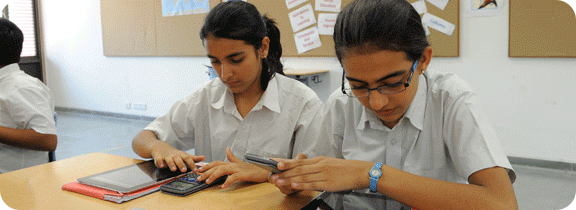
Admission Requirements
Choosing a school is an important decision in a child's and parent's life. We are here to help and answer any questions you might have.
We welcome enquiries about applying to the Academy. Our programmes are based on the principles and practices of the International Baccalaureate for primary and secondary-level students. The admission requirements for all the Academy's programmes, including language requirements, are outlined below.
Admission is competitive and based on student merit, regardless of a family’s ability to pay. The Academy endeavours to meet the demonstrated financial need of each admitted student.
Junior School
Grades 1–5: Primary Years Programme (PYP)
Students entering grade 1 ideally will have completed at least three years of nursery school and must be 6 years of age by 1 September of the year of entry.
Students may enter the first two years of the PYP without a strong prior knowledge of one of the languages of instruction, English or Hindi. However, in the last three years of the PYP, students must have a basic level of proficiency in both languages before they may be admitted.
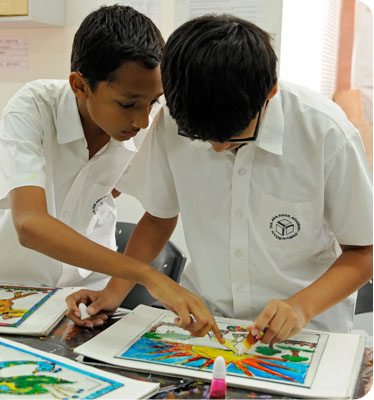 Senior School
Senior School
Students applying to the Senior School must have attained high scholastic achievement in their former educational institutions. They should also demonstrate a keen interest and participation in extracurricular activities such as sports, clubs, arts and music, and/or participation in community service projects outside the classroom.
Grades 6–10: Middle Years Programme (MYP)
Students without an intermediate level of proficiency in English may be admitted to the Middle Years Programme on a case-by-case basis. MYP students have the opportunity to study language A (language and literature) in both the official language (English) and national language (Hindi).
Grades 11–12: Diploma Programme (DP)
Applicants for the Diploma Programme must have demonstrated outstanding academic achievement as well as a record of active involvement in extracurricular and community service activities.
New students will not be accepted in the year of the Diploma exam.
Applying to the Academy
For further information about admissions, please contact the admissions office. Application and financial aid forms can be downloaded from the Application Forms page. Copies are also available from the admissions office.
*Please note that a completed financial aid form must be submitted together with the application form in order to apply for a bursary.
Tours of the Academy are held reguarly through the school year by appointment.
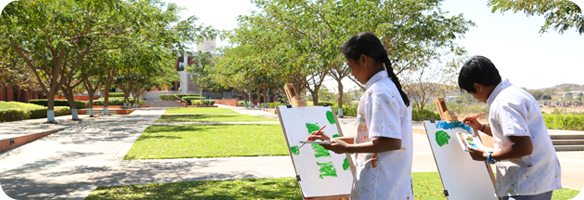
Financial Assistance
Admission to the Academy is competitive and based on student merit, regardless of a family’s ability to pay. The Academy endeavours to meet the demonstrated financial need of each admitted student. Students from all socio-economic backgrounds who satisfy the requirements for entry are encouraged to apply.
Partial to full financial aid is available to accepted students with a demonstrated need. Financial aid awards are reviewed annually and renewed only after reassessment of financial need.
The financial aid form can be downloaded from the Application Forms page. This form must be submitted to the Academy as part of the application package in order to be considered for a bursary.
For further information about admission, scholarships and financial aid please contact the admissions office.
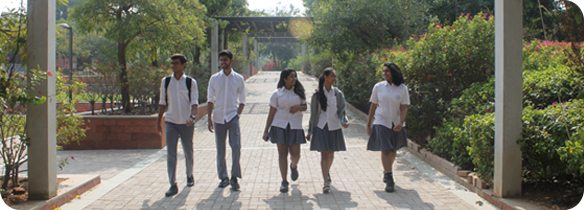
School Uniform
Junior girls |
|
| Grades 1–4 | Grey divided skirt and white shirt with badge printed on pocket |
| Grade 5 | Grey divided skirt/trousers and white shirt with badge printed on pocket |
Junior boys |
|
| Grades 1–3 | Grey shorts and white shirt with badge printed on pocket |
| Grades 4–5 | Grey trousers and white shirt with badge printed on pocket |
Senior girls |
|
| Grades 6–10 | Grey divided skirt/trousers and white shirt with badge printed on pocket |
| Diploma Programme level girls | Grey divided skirt/trousers and white shirt with badge printed on pocket |
Senior boys |
|
| Grades 6–10 | Grey trousers and white shirt with badge printed on pocket |
| Diploma Programme level boys | Grey trousers and white shirt with badge printed on pocket |
Other |
|
| Sports |
Black shorts/track pants and grey T-shirt |
| Shoes and socks |
Black shoes and ankle-length black socks |
| Warm clothing | Grey jumper with hood |
For more information on where to purchase the uniform, please contact the admissions office.
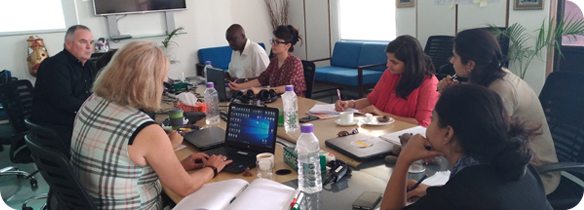
Teacher Professional Development
Promoting excellence in teaching and learning, both on campus and more broadly, is a fundamental goal of the Aga Khan Academies. Each Academy has a Professional Development Centre (PDC), which strengthens the profession of teaching in the region by investing substantially in teachers’ professional development.
Developing strength in teaching
We identify and develop teachers of the highest quality who are committed both to the all-round development of young people and to their own professional growth as excellent teachers.
Our PDC supports excellence in teaching by promoting best practices in teaching and learning. We provide ongoing, collaborative training for Academy faculty as well as outreach programmes for teachers and head teachers from neighbouring government, private and not-for-profit schools. Our faculty members also have the opportunity to collaborate with colleagues across the globe and to teach abroad within the Aga Khan Academies network.
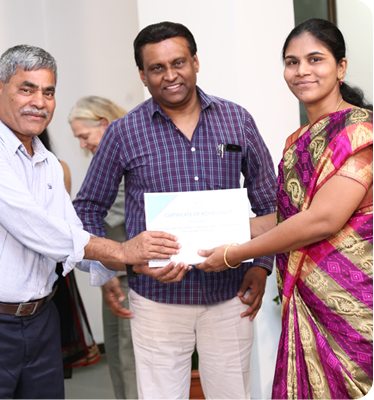 Learning at the PDC
Learning at the PDC
Progamming at the Academy’s PDC began in June 2010 with a course from the Professional Learning for Educators Series (PLES). The PLES programmes are designed by the Aga Khan Academies. They respond to the need to improve the standard of teaching and learning identified during extensive market research and interaction with government and departments of education.
The series includes programmes for teachers in various subject areas as well as specialised programmes focusing on skills and understandings related to education. We build professional competence by enhancing teachers’ subject knowledge and by examining how to teach that subject effectively. Each programme provides participants with a balance of intensive learning activities followed by an extended period of assisted application and observation within their own classrooms.
Strengthening curriculum and community
Through our professional development provision, we help create a professional community of competent, well-resourced teachers. These teachers will continue to support and collaborate with one another on resource development, by sharing best practices, and in establishing diverse academic, cultural and social projects.
News
